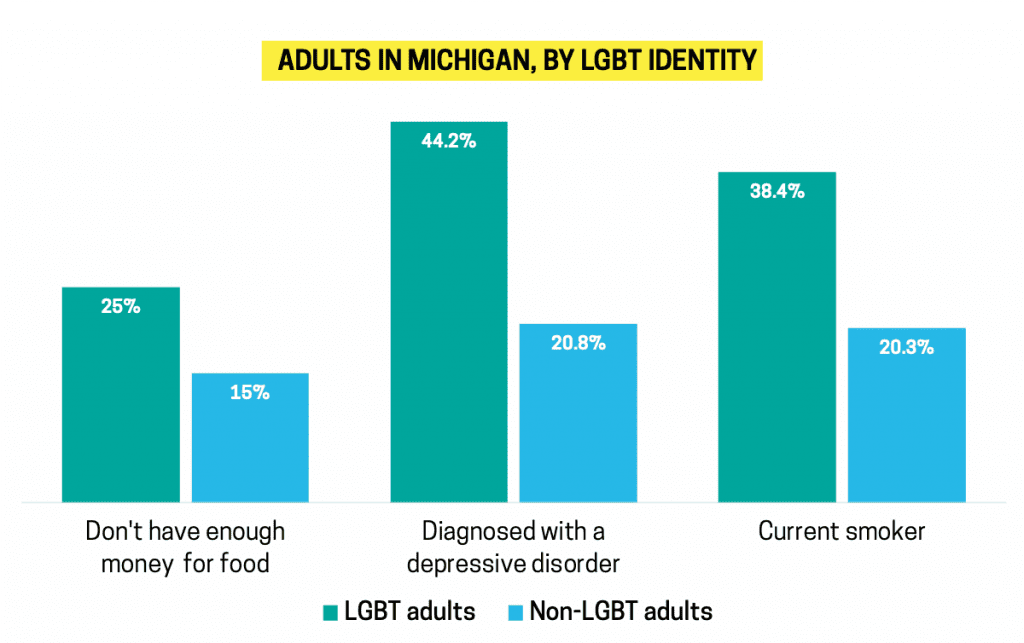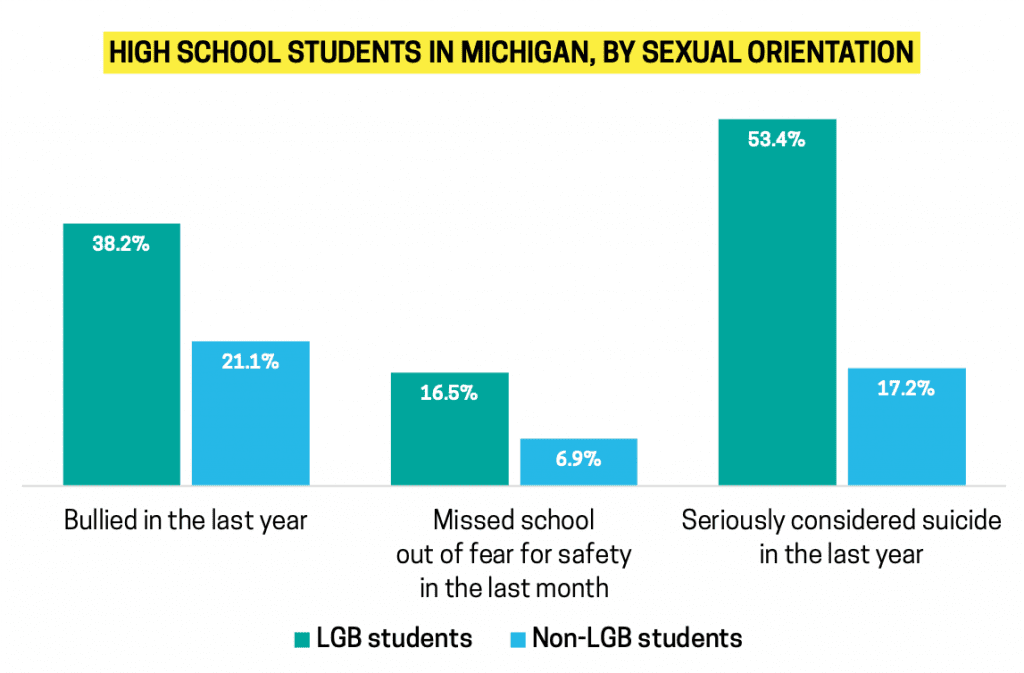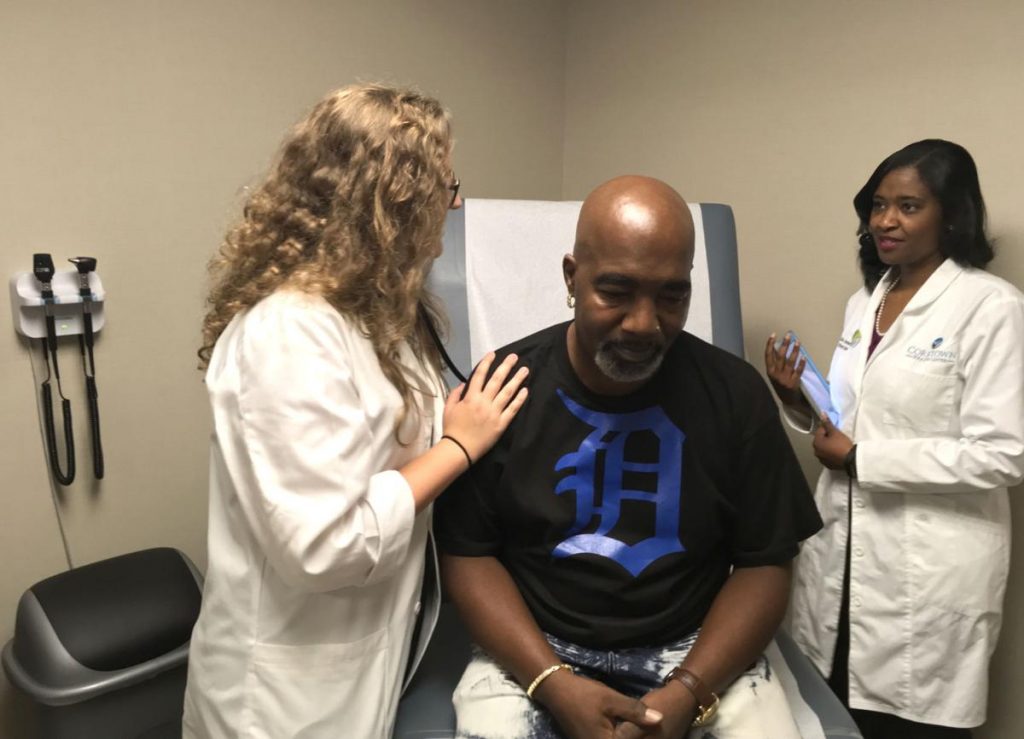
Pride month is a celebration—from colorful parades to charity fundraisers, June is a time to recognize the strength and achievements of LGBT* members of our communities. But the LGBT experience also comes with challenges. Lesbian, gay, bisexual, transgender, and nonbinary people are all too familiar with discrimination, stigma, and lack of representation, all of which can have substantial impacts on physical and behavioral health. As important as it is to celebrate the successes, it’s also critical to recognize the obstacles this community faces and to support the organizations combatting the inequities.
Data shows that across all ages, the 311,000+ LGBT individuals in Michigan experience additional health risks compared to the general population. A UCLA School of Law research study released last month examined the effects of stigma and discrimination on LGBT people in Michigan, and the results were troubling. LGBT adults in Michigan are more likely to smoke cigarettes, more likely to have been diagnosed with a depressive disorder, and less likely to have enough money for food.

LGBT youth in Michigan are more likely to be bullied, miss school because of feeling unsafe, and consider suicide.

And while older adults of all identities and backgrounds face health disparities and social isolation, LGBT older adults face distinct but similar, and often compounding, challenges. LGBT older adults are twice as likely than their cisgender, heterosexual peers to live alone, and three to four times less likely to have children who can support them or act as caregivers (National Resource Center on LGBT Aging).
82% |
of older LGBT adults have been victimized at least one time because of their perceived sexual orientation or gender identity. |
84% |
do not participate in regular senior center activities due to perceived lack of inclusiveness toward LGBT people. |
88% |
would be more comfortable if providers were specifically trained for LGBT patient needs. |
At the Health Fund, we’re committed to improving the care and health of every resident, especially those that are most vulnerable. That’s why we’re proud to partner with organizations working to improve health equity and outcomes for LGBT children and older adults.
For example, the Michigan Department of Education (MDE) is tackling the LGBT bullying issue head-on with an expansive initiative to build safer and more inclusive learning environments. With support from the Health Fund, MDE designed a multifaceted effort to address the troubling statistics around depression, thoughts of suicide, substance and alcohol use, and access to behavioral and physical health services.
Their initiative includes:
- Introductory and advanced day-long workshops offered throughout the state for mental health providers, school nurses, school administrators, teachers, and additional support staff.
- Dissemination of A Silent Crisis: Creating Safe Schools for LGBT Students, a nearly 200-page resource guide on the needs of LGBT children and their families.
- Multi-day, in-depth trainings of teachers to act as change agents in their school districts.
- Partnerships with youth-serving organizations to implement a statewide summit.
The challenge is complex, but MDE’s ultimate motivation is simple: “When our most marginalized students thrive, all students can thrive.”

A patient receives care at Corktown Health Center (photo from Corktown Health Center).
On the other end of the age spectrum, Corktown Health Center partnered with SAGE Metro Detroit and Wayne State School of Medicine to create the Silver Rainbow Health Initiative, the first formally coordinated effort to address the health needs of LGBT older adults in Michigan.
With a grant from the Health Fund, Corktown Health Center was able to expand its LGBT-focused health clinic to provide integrated, community-based medical care specifically for LGBT older adults. From primary care to behavioral health services and HIV care and treatment, Corktown Health Center offers services for health needs across the board. The center opened less than two years ago, but in that time they have seen over 2,000 patients and continue to grow in numbers and programming.
“The response to our center has been phenomenal,” said chief development officer Patrick Yankee.
In another integration-focused project, Health Fund grant partner Ruth Ellis Center provides clinical care alongside wraparound services for homeless, runaway, and at-risk LGBT children, youth, and young adults. The Detroit clinic is widely known for its unique model, often generating attention from celebrities (such as singer Sufjan Stevens) and businesses (including the Detroit Tigers’ “Pride Pack”). You can learn more about the Ruth Ellis Center in our 2017 profile of their model.
Back in 2016, we made a grant to the ACLU of Michigan to support a two-year effort to get resources to LGBT older adults that could use extra assistance. As part of this project, SAGE Metro Detroit created and distributed a Rainbow Resource Guide for LGBT older adults and provided training sessions to six Area Agencies on Aging around the state, including in rural areas and the Upper Peninsula, which continue to lack the support services that Michigan’s larger cities have to offer. The guide remains useful for businesses around Michigan.
These organizations are a few of many groups statewide that are pushing against the health inequities that so many LGBT residents of Michigan face. They offer an inspiring reminder that when it comes to LGBT health challenges, pride is a good start, but action has to follow.
* We followed SAGE Metro Detroit’s lead in using the initialism LGBT due to preferences expressed by older adults. This is not to exclude any categories or identities.
Resources:
Caregiving & LGBT Concerns in Michigan: A Guide for Caregivers – from SAGE Metro Detroit
The Impact of Stigma and Discrimination Against LGBT People in Michigan – from UCLA’s Williams Institute
LGBT Inclusivity Guide for Area Agencies on Aging – from SAGE Metro Detroit
Rainbow Resource Guide – LGBT-friendly businesses, organizations and service providers for LGBT older adults, service providers and allies from SAGE Metro Detroit
Ruth Ellis Center Training Request Form
Ruth Ellis Center Quarterly Community Training Information
